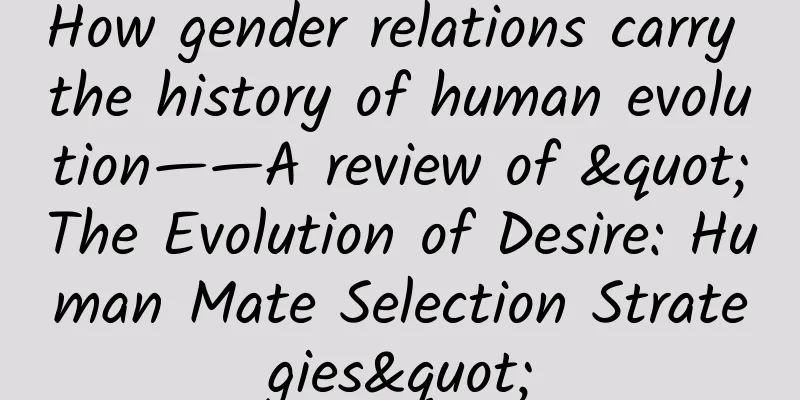How gender relations carry the history of human evolution——A review of "The Evolution of Desire: Human Mate Selection Strategies"

|
There is a short story in the classic American TV series "Friends". Chandler never thought Janice's laughter was annoying, but his friends couldn't stand it. It was not until they broke up that Chandler realized how "horrible" Janice's laughter was. As people often say, "love makes people blind". In many cases, passion is like a beautifying filter in the brain, which exaggerates all the advantages of our partner and makes us turn a blind eye to our shortcomings. Blind impulse is just the tip of the iceberg of gender relations. In real life, almost everyone will feel pain, happiness, depression, confusion, and madness because of gender relations. It is difficult to find another theme like gender relations, which is full of various poems, music, literature, movies, soap operas and variety shows, providing countless topics for society. Why do gender relations occupy such an important position in our lives? What are the causes of the various psychological and behavioral phenomena related to them? What mysteries throughout the history of human evolution can they reflect? In David M. Buss's book "The Evolution of Desire: Strategies of Human Mating", you will find the answers to these questions. Figure 1 The Evolution of Desire: Human Mate Selection Strategies (China Renmin University Press, August 2020) 1. David Buss and The Evolution of Desire In 1859, On the Origin of Species, the most significant work in the history of biology, was published. At the end of the book, it was mentioned that "evolutionary science will illuminate the research prospects of human origins... In the distant future, psychological research will be established on a new basis." Charles Darwin clearly told us that in addition to the adaptability of physical physiological characteristics, human spiritual attributes are also the result of natural selection over millions of years. Our psychological structure is a complex and sophisticated machine whose function is to enable organisms to survive and reproduce. Unfortunately, the "distant future" predicted by Darwin is indeed far enough away. For most of the 20th century, the social science community has always kept a distance from "using evolutionary theory to explain human psychological and behavioral characteristics." It was not until the mid-to-late 1970s that this situation began to change. Some scholars began to try to use evolutionary theory to explain human behavior, thus opening the prelude to the Darwinian revolution in the field of psychology. Among them, "gender relations" is both the front line of this revolution and the battlefield with the most fruitful results and the most recognized by other scholars. Professor David M. Buss of the University of Texas at Austin is a leading figure in the field of evolutionary psychology research on gender relations. When Buss first entered this field, there was almost no empirical research in this area, but in the 1980s, he conducted groundbreaking cross-cultural research on human mate selection strategies, and he is an undoubted pioneer. In his more than 40 years of academic career, Buss has published 9 books, published more than 200 academic papers, and won the Outstanding Scientific Contribution Award from the American Psychological Association. His "Evolutionary Psychology: the New Science of the Mind" has been one of the most widely circulated and influential popular science works in the field of evolutionary psychology since its first edition in 1999, and is also the most popular evolutionary psychology textbook in China. Another representative work of Bass, The Evolution of Desire: Human Mate Selection Strategies (hereinafter referred to as The Evolution of Desire), is a comprehensive study on the evolution of gender relations. The first edition of the book was published in 1994. Once it was published, it was translated into more than a dozen languages and was reprinted one after another due to market recognition. In subsequent editions, Bass incorporated new achievements in the field of mate selection strategy research, such as the origin of homosexuality, the explanation of female orgasm, and the impact of cultural background on gender relations. In August 2020, China Renmin University Press published the Chinese translation of the latest revised edition of the book (the English version was published in 2016). Therefore, to some extent, this book is not only a classic work that has been a bestseller for nearly 30 years, but also a new work that integrates current scientific research progress. Sexual relations have a special significance in the field of human behavior. In the process of human evolution, the explosion of civilization has enabled us to solve the survival dilemmas such as hunger, cold and the threat of predators, but reproductive competition has always been fierce, and all human members must strive to pass on their genes to the next generation. Sex is not just a biological behavior pattern, it is a core part of our lives. For an evolutionary psychologist, "sexual psychology" is all-encompassing: self-esteem in adolescence, primitive sexual impulses, competitive consciousness in adulthood, pursuing or abandoning partners, parent-child relationships, and facing death calmly... Everything is related to reproduction. Sex is both a goal and a means. We have invented all kinds of laws, concepts and taboos related to sexual selection. We describe sex, talk about sex and study sex. We compete for sexual resources, for more wealth, higher status, more attractive appearance and more attractive qualities. In short, humans are truly creative in sex. No behavior has a more significant impact on human evolution than sex. To a certain extent, gender relations carry the history of human evolution. As Bass said: "Those who cannot successfully choose a mate cannot become our ancestors... Every living person is a descendant of that long and uninterrupted chain of successful mate selection... Our mate selection mentality - romantic joy, burst of passion, success of love are the lucky products of this evolutionary process." The book "The Evolution of Desire" is based on an evolutionary perspective to reveal the various unconscious motivations, laws and genetic strategies hidden behind human mate selection behavior. 2. Writing Features: Using the most rigorous science to explain the most realistic gender phenomena The book "The Evolution of Desire" presents several basic characteristics: First, the content is comprehensive. This book covers almost all issues related to gender relations, such as: Which indicators do men and women value more in long-term mate selection? What is the evolutionary significance of this difference? Why are men more likely to have sexual fantasies, cheat, and buy sexual services? Why are women more likely to wear makeup and have plastic surgery? What does a good figure and beauty represent? What emotional manipulation methods do women use? What is the relationship between humor, art, morality, and creativity and mate selection? Why do people sometimes prefer "virgins" and sometimes "sluts"? What benefits can loyalty bring? How to explain the origin of homosexuality? How to understand the phenomenon of sexual harassment and sexual assault? Why is commitment sometimes a form of self-deception? In the book, you can see how Bass uses a simple and unified theory to explain various sexual issues: In general, they are all adaptive mechanisms and mate selection strategies formed by human ancestors in the evolutionary environment, with the goal of increasing the reproductive benefits of genes. Second, the empirical content is rich. Bass himself is a pioneer in the field of empirical research in evolutionary psychology. He has conducted the largest survey of human mate selection desire in history, which lasted for 5 years and spanned 37 cultures, covering more than 10,000 subjects of different races, political systems, development stages, religious beliefs, income levels and marriage systems. The laboratory he led has conducted more than 100 empirical studies on the topic of mate selection since the 1980s. In addition to his own research, Bass also brought together research results from multiple disciplines such as social psychology, physiological psychology, medicine, media studies, animal behavior, cognitive neuroscience and even paleoanthropology in the book. Therefore, the specific hypotheses in the book are not castles in the air, but have sufficient direct or indirect supporting evidence. Bass fully demonstrated the outstanding achievements of evolutionary psychology as a science in the field of gender relations. Third, the wording is scientific and rigorous. Bass repeatedly emphasized in the book that the term sexual strategy is just a metaphor, but it does not mean that humans will "intentionally" make various strategic choices. Just like heartbeat is a biological strategy, its function is to provide sufficient blood flow and various nutrients to human organs and tissues, but we will not consciously use the strategy of heartbeat, everything is done automatically. Long before our ancestors had all kinds of complex thoughts, human sexual selection and reproduction history had already occurred. Evolution does not use human rationality and wisdom, but emotions and intuition, which affect human mate selection behavior through the opening and closing of emotional valves. The genes carried in our bodies regulate different emotions to make us "show" rational and logical behavior, but they are not the result of intentional thinking. For example, if two genes exist at the same time, one gene will make women more "feeling" for men with a sense of family responsibility, and the other gene will make women feel more for romantic wanderers. It can be expected that the children of the former woman will survive and reproduce better under the care of their father, and the genes that regulate her preference will also win the competition because her offspring will continue to inherit its genes. But this woman does not need to understand why she likes responsible men, does not need to think about what she can get from being with such a man, and does not need to calculate the benefits her future children will get. She just needs to "love" him. Emotions are designed to be the executors of evolutionary logic. Fourth, it is step-by-step and easy to understand. In fact, Darwin insightfully proposed the theory of "sexual selection" in his 1871 masterpiece "The Descent of Man and Selection of Relation to Sex", which laid the foundation for the grand building of sexual research; in the 1960s and 1970s, William D. Hamilton proposed the "kin selection theory", George Williams and Robert Trivers proposed the "parental investment theory", and John Maynard Smith proposed the "frequency-constrained selection theory", which built a solid skeleton for this building. However, in this book, Bass did not talk about these grand theories or abstract concepts at the beginning. He was problem-oriented and took the development stage of gender relations as a clue. He interspersed the awkward theoretical knowledge in the interpretation of gender relations, integrated the phenomenon, theory, explanation and evidence, and slowly unfolded and told the story, which greatly lowered the reading threshold of this book. It is no exaggeration to say that people without any academic background can read this book without any obstacles. 3. Social and practical significance: the impact of lifestyle changes on mate selection Through this book, we can see that mate selection strategy is not only about individuals, but also can explain many characteristics of current social transformation and trigger our thinking about social reality issues. For example, the marriage rates in major countries in Europe, America and East Asia are declining and have reached the lowest level in history. The reason is that the essence of marriage is a behavior pattern born under special physiological and upbringing conditions for the purpose of genetic reproduction. In modern society, with the changes in economy, welfare, law and other lifestyles, marriage is no longer a necessary condition for raising children, and marriage is gradually losing its original function. In fact, the change in our lifestyle will also have a wide-ranging impact on mate selection tendencies. Since mate selection preferences serve genetic inheritance, the invention of certain technological conditions in modern society has made these preferences no longer necessary for reproduction: paternity testing can ensure that husbands do not have to worry about being deceived and raising other people's children; in vitro fertilization allows women with poor fertility resources to pass on their family line; the improvement of women's independent economic ability means that they do not need to worry about their husbands' abandonment; the improvement of the overall welfare level of society has led to a significant reduction in the difficulty of raising children by single parents... In short, many goals that were originally achieved by mate selection preferences can now be achieved through other means, so mate selection preferences will also change accordingly. The most typical example is that as reliable contraceptive measures become more and more popular, the possibility of women getting pregnant unexpectedly is greatly reduced, so men's emphasis on their spouse's sexual relationship history and chastity will continue to decline. At the same time, reliable contraceptive measures have also led to the increasing prevalence of short-term sexual relationships. Of course, changes in the mate selection environment can sometimes bring many bad consequences. Human ancestors lived in hunting-gathering tribes. In such small societies, each man had only a dozen potential partners, so maintaining a long-term and stable relationship with his spouse was a natural and necessary choice. In modern big cities, every man can come into contact with hundreds of young people of the opposite sex who are in their "golden reproductive period" in their daily lives. More importantly, they can see countless sexy beauties through the Internet, magazines, television, mobile phones, movies and advertisements. Visual impressions can inadvertently trigger men's evaluation mechanisms, causing them to have higher standards for mate selection or be more likely to be dissatisfied with their spouses. At the same time, these media images can also bring potential harm to women. They introduce an unhealthy competitive relationship, causing more and more women to reach the (but unrealistic) beauty standards expected by men through extreme means such as dieting or plastic surgery. 4. Moral and Scientific Positions: Anti-naturalistic Fallacy and Genetic Determinism It is particularly important to emphasize the moral and scientific stance of this book. In the book, Bass clarifies many misunderstandings about evolutionary science. Among them, the "naturalistic fallacy" is a common thinking bias when people face evolutionary explanations. This concept often regards "existence" as "reasonable." But in fact, exploring the evolutionary causes of a behavioral mechanism is not the same as defending it. Just like there are plagues, parasites, genetic diseases, and meteorological and geological disasters in nature, we always try to eliminate these natural events and never think they are reasonable. "Naturally it is so" does not mean "it should be so." Evolutionary psychologists will propose the origins of certain human psychological tendencies and show the public how natural evolution has shaped these psychological tendencies. But this does not mean that all of this is unchangeable, and we have no reason to use the natural selection process as our moral standard. For example, male sexual jealousy is an adaptive mechanism that has evolved to protect male genetic interests. However, phenomena such as wife killing, domestic violence, infanticide, and circumcision caused by sexual jealousy have caused great harm to women around the world. Understanding the evolutionary roots of male sexual jealousy does not mean that we should accept or promote it. Many of our sexual beliefs were formed by our ancestors in a hunter-gatherer environment. After generations of succession, these beliefs, which are incompatible with post-industrial society, are still engraved in our brains. Compared with the modern moral positions we want to pursue, they are sometimes dark and barbaric, and extremely stubborn, such as conservative views on chastity and marriage, stigmatization of women, gender stereotypes, and rape impulses. When we try to understand the causes of certain genetic diseases, it is not to excuse the diseases, but to better prevent and treat them. Similarly, if we want to pursue a standard that contradicts natural selection, at least we should first figure out where the positions we oppose come from. This is the value of evolutionary explanation. Those overly wishful idealistic beliefs - such as believing that men and women are completely equal in physiology and psychology, that humans do not judge people by appearance, and that women do not care about the economic status of their spouses - will not bring a true paradise. On the contrary, acknowledging that our psychological structure has an outdated side, while exploring its roots and fighting against it, will bring us closer to a beautiful utopia. In terms of scientific stance, Bass specifically clarified the label of "genetic determinism" that was wrongly attached to evolutionary science. Many people worry that if mate selection strategy is rooted in our evolutionary biological system, then it should be constant and unchanging, and we are destined to obey the rules of biological instinct, just like a machine that receives instructions rigidly. This belief mistakenly sets the environment and genetic factors in complete opposition and belittles the flexibility of human adaptive mechanisms. In fact, human behavior is the product of both. What is built into us by genetics is not behavior, but developmental programs, which adjust the direction of individual psychological development according to feedback information from the social environment. Natural selection has designed a huge and beautiful brain for humans. One of the important reasons for its existence is that we can be sensitive to environmental cues such as gender, status, and other things that are closely related to our reproductive prospects, so as to choose the mate selection strategy that best suits the current environment. For example, it has installed "family first" software for men, but also "abandon wife and children" software. As for which software an individual will run, it depends on factors such as his perception of his own attractiveness, the number of opposite-sex resources in the environment, and the cost of raising children in a specific environment. We do not adopt a single unchanging strategy, but choose the most appropriate strategy from a list of options. Individuals do not lack the power to control their own destiny. In short, whether in gender relations or other fields, "diversity" and "flexibility" are the fundamental characteristics that evolution has given to humans, and evolutionary psychologists are true environmental-genetic interactionists. 5. The value of “self-help”: creating harmonious relationships between the sexes Although Bass believes that the research on human mate selection strategies in the book only serves academic purposes and does not carry any political intentions, this does not mean that the knowledge in the book has no practical significance for individuals. In fact, this book can be regarded as a psychological self-help book about gender relations. Unlike clichéd chicken soup for the soul, it truly reveals the mystery and essence of human mate selection. The knowledge about gender in the book can profoundly affect a person's view of love and marriage. It can help each of us understand ourselves better and understand the desires and needs of the opposite sex; it can help us choose the most appropriate courtship behavior, and it can also help us avoid frustration and helplessness in various dating scenarios - whether it is an encounter in adolescence, a college fraternity, or a blind date after work; it can help us restrain impulses, solve doubts, and resolve conflicts and reconcile with each other. Genes are cold and heartless, but they can breed warm emotions. There are always some couples in this world who can always support each other no matter what hardships they go through, what diseases they face, just like their marriage vows: "Be faithful to you forever." Two individuals who were originally unrelated can pool their resources together and stay together for life. This is the greatest feat in the history of human emotions. In a relationship, we not only rely on each other to meet certain needs of our own, but also create new achievements together and work together to reap the fruits of victory of human mate selection strategy. Knowledge about mate selection strategy can help us achieve this perfect harmony. From the earliest single-celled organisms, the Earth has gone through more than three billion years of unpredictable life journeys. After countless accidents, luck and coincidences, humans have blossomed the unique flower of wisdom on this planet. The complex human brain is actually a means for genes to "create" for self-perpetuation, but now we can use the brain to reflect on and reveal the creative process itself. The book "The Evolution of Desire" is the embodiment of our reflection results. As emphasized many times in the book, gender relations are living fossils of human history. Exploring and understanding mate selection strategies can not only let us know where we come from, but also allow us to design a better future for ourselves! Author: Yin Rong This article is reproduced from "Popular Science Creation Review" Issue 2, 2021 (Typesetting: Zhang Xinmu Editing: Huang Qianhong Reviewing: Zou Zhen) |
<<: What is the symbolic meaning of Bailu? Why do we drink Bailu tea during Bailu?
>>: How to maintain health during the Bailu solar term? What to eat during the Bailu solar term
Recommend
When do girls' bones close?
Skeletal closure is an inevitable phenomenon in t...
What is the cause of bleeding during intercourse after wearing an IUD?
With the development of society, technology is al...
I got old after the drug flow
Most women are reluctant to face the fact that th...
Is root rot fungal or bacterial? What is the best treatment for root rot?
Root rot affects both vegetables and fruit trees,...
Treatment of breast lumps in early lactation
If breastfeeding is not done correctly during lac...
Can I soak my feet in salt water during confinement?
After giving birth, women need to recuperate thei...
What is the reason for the white spots on the areola?
White spots on the areola are a very common probl...
A hard lump grew on the vulva
Women often report that they have small bumps on ...
The dangers of premature menopause in women
Female menopause is a cyclical law of the body. I...
Will ovulation occur five days before menstruation?
Generally speaking, for women with normal menstru...
How much does chin correction cost?
A crooked jaw is also known as mandibular retrogn...
Why do babies have a lot of white on their bodies when they are born? Can the baby's vernix caseosa be absorbed by itself?
For mothers who are giving birth for the first ti...
How to restore an enlarged uterus to normal
The uterus is the main reproductive organ unique ...
Is a soft belly a sign of a girl?
After becoming pregnant, the most important issue...
What are the symptoms of depression in women
With the increasingly fast pace of life today, mo...









